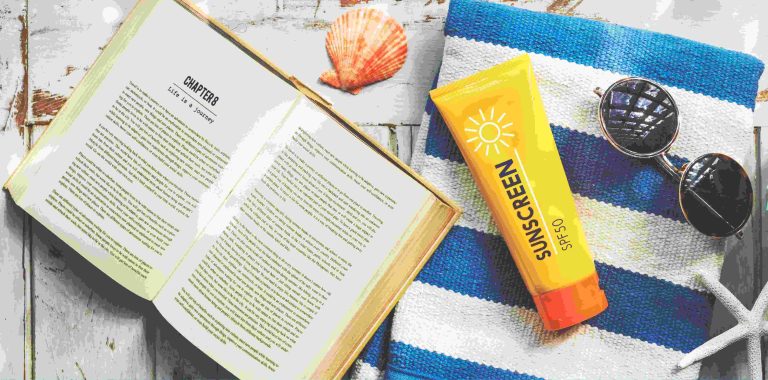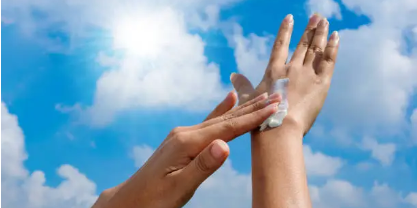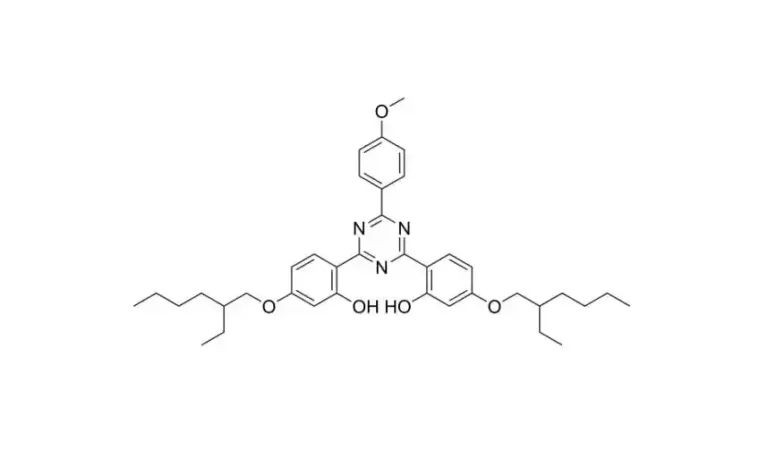A luz do sol se sente quente e levanta nossos espíritos. No entanto, danifica a pele com raios ultravioletos, acelerando o envelhecimento. Para os negócios da pele, criando produtos que lutam fotografia e oferecer uma forte defesa UV é uma grande vitória. Funciona como um ingrediente que absorve os raios UV e os transmuta em energia menos perigosa.um filtro UV de ponta, protege a pele e ajuda evitar quebraços.
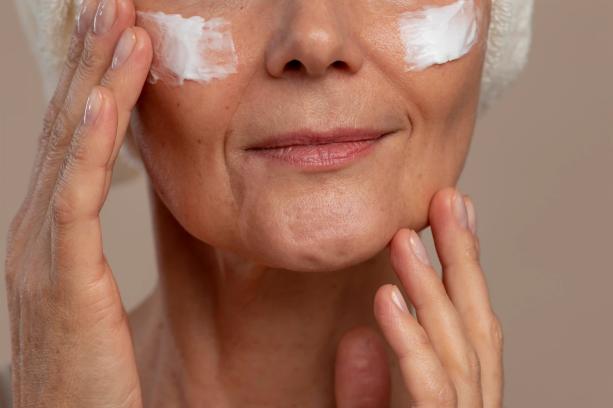
Este blog mergulha em como Bisoctrizole mistura proteção solar de alto nível com benefícios antienvelhecimento. É perfeito para marcas que querem impressionar clientes sabios.
O que é Bisoctrizole? Uma mudança de jogo na ecrã solar
Bisoctrizol, também chamado Tinosorb M, é um filtro UV especial. Ela brilha em protetores solares devido à sua configuração única. Contrariamente aos filtros regulares que se misturam em óleo ou água, o bisoctrizole usa pequenas partículas (< 200 nm). Esses atuam como tanto escudos orgânicos como inorgânicosEles se submergem, saltam para trás, e espalham raios UVA e UVB. Isso dá toda proteção contra todos os raios UV. É ótimo para fazer protetores solares que funcionam bem e se sentem bons.
O bisoctrizol fica forte sob a luz solar. Muitos filtros enfraquecem com o tempo, mas não este. Ela continua trabalhando por horas. Além disso, ajuda outros filtros, como o metoxicinamato de ocilo, a permanecer eficazes. Isso faz com que seja uma escolha superior para contra o envelhecimento da proteção solar fórmulas.
Como raios UV causam o envelhecimento da pele
Para ver por que Bisoctrizole luta contra o envelhecimento, vamos olhar para raios UV. Fotografia acontece quando a exposição ao sol envelhece a pele rápido demais. Dois tipos de raios UV causam isto:
- Rays UVA: Eles vão profundamente na pele. Eles quebram colagênio e elastina, que mantêm a pele firme e esticada. Isso leva a ruídos, sagging e tono desigual.
- Rays UVB: Elas atingiram a superfície da pele. Elas causam queimaduras solares e danos ao DNA, aumentando riscos de câncer de pele.
Ambos os raios criam radicais livres. Esses são pedaços instáveis que atacam células da pele. Eles aceleram degradação do colágeno e causar estresse na pele. Com o tempo, isso mostra como linhas finas, pontos escuros, e menos pele saltante.
Por que a protecção solar anti-envelhecimento é chave para marcas
Os clientes de hoje sabem muito. Eles querem produtos que protejam e melhorem a saúde da pele. Para parceiros do B2B, usando Protecção do bisoctrizol UVA nos produtos nos separam. Ela satisfaz a necessidade de uma pele multitarefa. Ela mistura defesa solar com benefícios anti-envelhecimento. Isso apela às marcas que pretendem oferecer soluções inteligentes e de valor.
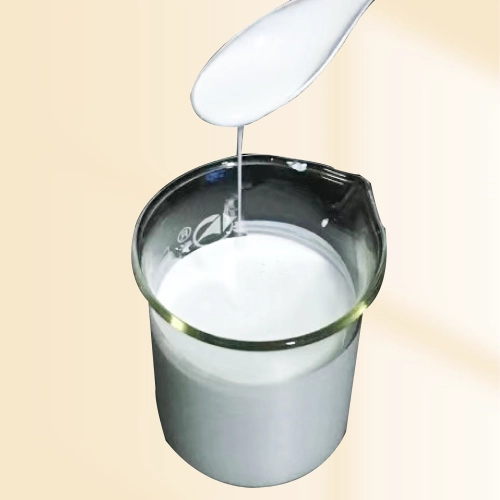
Como Bisoctrizole Pare de Fotografar
Bisoctrizol Protecção do bisoctrizol UVA faz com que seja uma ferramenta forte contra fotografiaBloquea raios UVA, economizando colagênio e elastina. Isso mantém a pele firme. Sua proteção ampla também impede o dano da UVB, cortando queimadura solar e dano celular. É assim que mantém a pele jovem e saudável:
- Escudo UV completo: Bisoctrizol absorve raios UVA e UVB. Também os reflete e espalha. Não passam raios nocivos.
- As fábricas modernas da BFP produzem sua proteção solar em grandes lotes com controles de qualidade rigorosos. Sua rede de navegação mundial dá seu produto a tempo, quer você esteja vendendo na América do Norte, Europa ou Ásia.: Não se quebra na luz solar. Isso significa proteção duradoura, ao contrário dos filtros mais fracos.
- Luta contra radicais livres: Ele impede radicais livres causados por UV. Isso reduz o estresse na pele, uma grande causa do envelhecimento precoce.
- Fica na superfície: Suas grandes moléculas não se afundam na pele. Isso o torna seguro para uso diário.
A Ciência apoia o poder antienvelhecimento da Bisoctrizole
Estudos provam que Bisoctrizole funciona. - Pesquisa em International Journal of Cosmetic Science mostra que mantém fórmulas de proteção solar estáveis. Protege contra perdas de colágeno causadas por UVA Herzog et al., 2002Outro estudo em Farmacologia e fisiologia da pele descobriu que apenas entra na pele (0,01-0,06% da dose aplicada). Isso prova que é seguro para uso a longo prazo Mavon A et al., 2007Esses fatos fazem Bisoctrizole uma escolha confiável para marcas que querem produtos anti-envelhecimento apoiados pela ciência.
Fazer ecrãs solares com Bisoctrizole: Por que os fabricantes adoram isso
Para os fabricantes de peles, Bisoctrizole traz vantagens reais. Faz a criação de produtos mais fácil e mantém os clientes felizes. Aqui está um olhar rápido:
| : Perfura mais fundo na pele, levando ao envelhecimento e danos duradouros. | leads no fornecimento |
| Proteção de largo alcance | Bloquea UVA e UVB. menos filtros necessários. |
| Fica estável | Continua trabalhando sob o sol. Faz os produtos confiáveis. |
| escudo híbrido | Soap up, reflects, and scatters UV rays for top defense. |
| Fórmula Luz | Cria texturas não adesivas e confortáveis que os clientes adoram. |
| Alimenta Outros Filtros | Faz com que outros filtros UV funcionem melhor. - Melhoria a estabilidade das fórmulas. |
Usando Bisoctrizole, os fabricantes podem criar protetores solares que evitar quebraçosEles também se sentem leves e não irritantes. Os clientes adoram isso. Ela também funciona bem com outros ingredientes. Isso permite que as marcas façam tudo de cremes diários a protetores solares fortes.
Resolver as queixas dos clientes
Muitos odeiam protetores solares que se sentem grossos, deixam marcas brancas, ou precisam de reapplicação constante. Bisoctrizole resolve esses problemas:
- Luz e suave: Suas pequenas partículas se misturam na pele. Não se sente pesado como proteínas solares minerais.
- Parece bom: Nenhum resíduo branco. - Funciona para todos os tons da pele.
- Dura muito«[UNK] O dióxido de titânio deixa um caste branco? "Como evitar isso?" - BFP
Ficar na praia ou piscina no verão é super divertido, mas manter sua pele segura dos raios nocivos do sol é um grande problema, especialmente quando você está nadando. O dióxido de titânio protege o sol. Mas ele aguenta um dia de verão brilhante? Este guia […]
Imagine executando uma marca de proteção solar onde você precisa de filtros UV de alta qualidade como Bisoctrizole para ficar à frente. Problemas com a cadeia de fornecimento, como materiais faltantes ou atrasos de envio, podem arruinar seus planos e irritar os clientes. Para marcas à procura de um fornecedor confiável de Bisoctrizole 2024, o BFP é uma escolha forte. Eles usam suas grandes fábricas e envios inteligentes na China para manter a entrega em massa da BFP em caminho. Este blog olha para os riscos que podem prejudicar o abastecimento de Bisoctrizole e como as soluções da cadeia de abastecimento UV da BFP mantêm as coisas suaves para os compradores. O que é Bisoctrizole e Por que é a chave para os ecrãos solares Bisoctrizole, também chamado Tinosorb M, é um grande filtro UV que bloquea tanto UVA quanto […]
Imagem começando sua própria marca de proteção solar, formada para corresponder aos seus sonhos, sem problemas de fazer receitas de filtro UV complicadas de nada. Para pequenos e médios negócios, saltar no mundo ocupado de protecção solar pode parecer assustador. Mas com o ajudante certo, é uma oportunidade de brilhar. O Bisoctrizole da BFP é um filtro UV forte e de alto nível que pode fazer seu rótulo privado de proteção solar aparecer em um mercado embalado. Este guia explica como o Bisoctrizole da BFP, juntamente com a ajuda OEM/ODM completa, permite que as marcas construam grandes produtos de proteção solar rapidamente e bem. O que é bisoctrizole e porque é ótimo para seu bisoctrizole de ecrã solar, é um filtro UV moderno e amplo que guarda contra raios UVA e UVB. É […] BFP Z40s Oxide de zinco em pó Descobre os incríveis benefícios do pó solar de dióxido de titânio para proteção diária contra radiação UV! Este mineral amigável da terra fornece uma forte defesa contra radiação nociva. Ela é suave o suficiente para todos os tipos de pele. Aprender como funciona, seus benefícios e por que BFP’ os produtos s ão perfeitos para sua rotina cutânea em nosso guia. O que é dióxido de titânio e como é usado na protecção solar? Dióxido de titânio é um mineral que ocorre naturalmente. Ela se usa amplamente em protetores solares como ele é um bom protetor da pele contra radiação UV danificada. Ela é um filtro físico UV. O papel do dióxido de titânio como um filtro físico UV Dióxido de titânio funciona através da absorção, salto […] A BFP mantém Bisoctrizole extra e seus materiais à mão. Isto impede deficiências quando a demanda salta ou problemas atingem. Ela mantém seu abastecimento estable, tornando-os um fornecedor confiável de Bisoctrizole 2024.Ficar na praia ou piscina no verão é super divertido, mas manter sua pele segura dos raios nocivos do sol é um grande problema, especialmente quando você está nadando. O dióxido de titânio protege o sol. Mas ele aguenta um dia de verão brilhante? Esse guia descubre como é proteção solar de dióxido de titânio resistente à água, como funciona quando você nadar, e como aplicar de novo o direito para manter sua pele segura. Por que escolher um ecrã solar de dióxido de titânio para o Verão? O dióxido de titânio é um componente natural que torna o dióxido de titânio incrível para proteção solar. Durante o verão, quando os raios solares são particularmente fortes, […]
Manter a pele delicada do seu bebê segura do sol é muito importante. Não todos os protetores solares estão bem para pequenos. Os médicos que cuidam das crianças muitas vezes dizem que proteção solar de dióxido de titânio é uma ótima escolha para bebês e crianças. Com toneladas de escolhas lá fora, encontrar a melhor pode parecer difícil. Este guia mostrará por que o dióxido de titânio é fantástico para bebês, o que procurar numa proteção solar, e em que produtos os médicos confiam. Por que a proteção solar de dióxido de titânio é ótima para bebês bebês têm pele super suave e fina que fica magoada pelo sol mais facilmente do que pele adulta. Dióxido de titânio (TiO) ₂) é um ingrediente natural de proteção solar. - Ele senta em […]
- A proteção solar não é só para o verão mais. É um diário que deve ter. As pessoas se preocupam mais com saúde cutânea proteção da UV agora. Eles querem opções verdes e seguras. É por isso que os protetores solares minerais, especialmente aqueles com dióxido de titânio, estão ficando populares. Este blog olha para tendências de proteção solar do dióxido de titânio. Mostra porque as marcas adoram esse ingrediente. Também exploraremos novas maneiras de usá-la e como os fornecedores de filtros de UV minerales formam o mundo de proteção solar. Por que as proteínas solares minerais estão crescendo O mundo da proteína solar está mudando rápido. As pessoas querem produtos baseados em minerales mais do que nunca. Eles se preocupam com proteínas químicas solares. Elas podem irritar a pele ou danificar o meio ambiente. O dióxido de titânio, um mineral natural, é uma escolha superior. É […]
Tanto o dióxido de titânio como o óxido de zinco proporcionam proteção UV completa. Isso importa porque dois tipos de raios UV, UVA e UVB, danificam nossa pele. Os raios UVA alcançam mais profundos. Eles vão para a pele. Eles causam ruídos e sagging. Eles estão presentes todo o ano, até passando pelas janelas. Os raios UVB são mais curtos. Eles atingiram a camada superior da pele. Elas causam queimadura solar e danos no DNA nas células da pele. Isso pode levar a câncer de pele. Protetores plenos contra ambos os tipos de danos. O que é óxido de zinco? O óxido de zinco é um mineral popular em produtos de proteção solar. É conhecido por suas qualidades únicas. Parece um material branco e em pó. - Ela vem em minúsculas e […] fotografiaCreme solar é um diário essencial para proteger sua pele. Mas muita gente se preocupa com o que está nele, especialmente o dióxido de titânio. Eles querem algo que os mantém seguros do sol sem causar problemas de saúde ou magoar o planeta. perguntas sobre proteção solar do dióxido de titânio aparecem todo o tempo, particularmente em torno das partículas nano versus não nano. Eles são arriscados? Este blog cava nos fatos, quebra alguns mitos, e ilumina os altos padrões atrás dos produtos de dióxido de titânio de alto nível, como os feitos pela Shanghai BFP[UNK]NewMaterial Co., Ltd. (BFP). O que é dióxido de titânio e como ajuda a sua pele? O dióxido de titânioé um mineral encontrado na natureza. É usado no dióxido de titânio […] - Imaginem-se planejando um dia de praia sol ou uma caminhada nas montanhas. Você pega sua proteção solar, mas depois você pausa -- dióxido de titânio ou óxido de zinco? Qual é melhor para sua pele? Ambos são estrelas em proteínas solares minerais, conhecidas pela sua segurança e energia contra raios UV. Mas eles não são iguais. No BFP, somos especialistas em fornecer dióxido de titânio e óxido de zinco de alta qualidade para fabricantes de proteção solar. Vamos mergulhar no que os separa para que você possa escolher o certo para você. A composição e as características da protecção solar do dióxido de titânio alguma vez se perguntaram como a protecção solar mantém raios UV em baixa? O dióxido de titânio senta-se na sua pele como um espelho, refletindo esses raios […]
A proteção solar do dióxido de titânio é uma superescolha para manter a pele suave segura dos raios UV. Sua bonita e dura cobertura ajuda todos os tipos de pele, especialmente aqueles que ficam vermelhos ou feridos rápido. Esse guia mostra como o dióxido de titânio funciona, por que é ótimo para pele suave, e como o BFP de Xangai dá um dióxido de titânio fantástico para protetores solares. O que faz o dióxido de titânio efetivo contra raios UV? O dióxido de titânio é um forte mineral em proteínas solares. É famoso por bloquear raios UV ruins. Suas características fixes fazem com que seja uma escolha confiável para toda proteção. Ela mantém a pele segura de raios UVA e UVB. A Ciência atrás da proteção UV do dióxido de titânio Dióxido de titânio faz uma capa […] - Por que a proteção do Bisoctrizole UVA é melhor que outros filtros?
Ela permanece estável na luz solar. Também absorve, reflete e espalha raios UVA. Isso dá proteção mais forte e mais longa do que filtros que fraquecem rápido. - Bisoctrizole pode fazer protetores solares ligeiros?
Sim. Suas pequenas partículas criam fórmulas lissas e não pegajosas. Eles se sentem ótimos na pele e trabalham diariamente contra o envelhecimento da proteção solar. - Bisoctrizole ajuda com defesa radical livre?
Ela impede que raios UV façam radicais livres. Isso reduz o estresse cutâneo. Ajuda a manter a pele jovem e saudável.
Alimenta sua linha de ecrã solar agora
Skincare se move rápido. As marcas precisam de produtos frescos e multitarefas para se destacar. Bisoctrizole oferece Protecção do bisoctrizol UVA e benefícios anti-envelhecimento. Ela atende às necessidades do cliente para protetores solares eficazes e favoráveis à pele. Usando esse filtro ultravioleta superior, sua marca pode fazer produtos que lutam fotografia e impulsionar uma defesa radical livreIsso levanta sua linha de produtos para novos níveis. chegar a um fornecedor confiável como Shanghai BFP para explorar Bisoctrizole com A BFP mantém Bisoctrizole extra e seus materiais à mão. Isto impede deficiências quando a demanda salta ou problemas atingem. Ela mantém seu abastecimento estable, tornando-os um fornecedor confiável de Bisoctrizole 2024.Fiquem em frente no jogo da pele.

